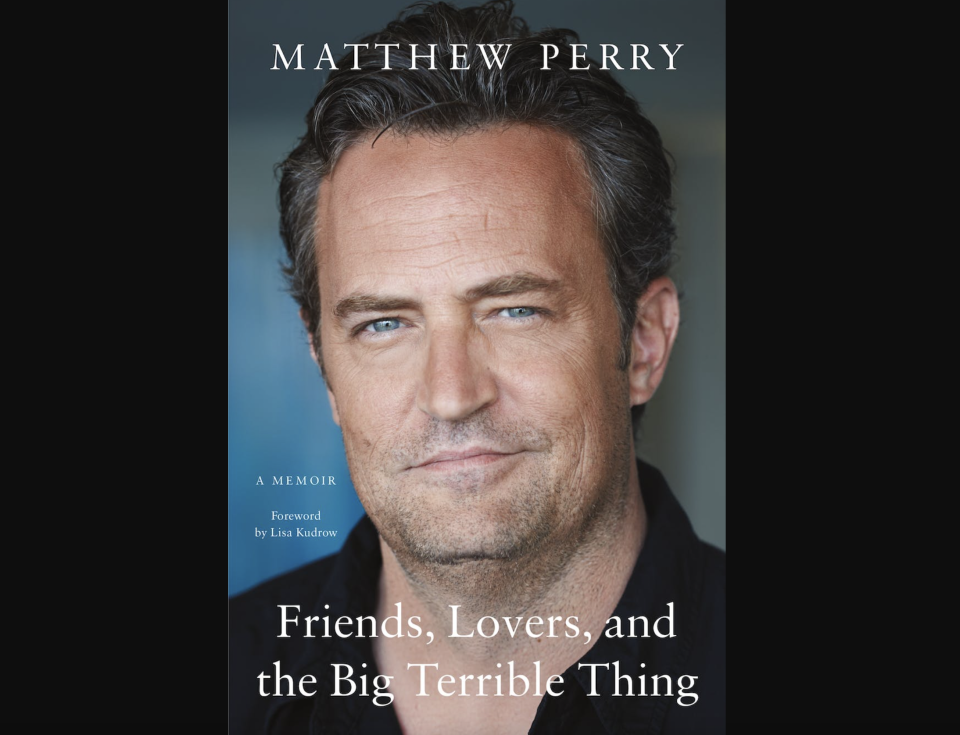Matthew Perry‘s memoir is filled with raw details about his raging addiction.
Friends, Lovers, and the Big Terrible Thing goes on sale Nov. 1, but a new interview and book excerpts reveal in shocking detail the depth of the 53-year-old actor’s struggles with alcohol and opioids. Among the disclosures is that Perry estimates he has spent $9 million to get sober. He currently has 18 months of sobriety, meaning he got sober again just prior to the 2021 Friends reunion, after nearly dying when his colon burst from opioid misuse in 2018. More details of that dramatic near-death experience, including that he had to learn to walk again, have also come to light.
Perry was just 14 when he started drinking. At 24, he had joined the cast of Friends and his alcohol addiction was starting. It morphed into drinking vodka by the quart and taking 55 Vicodin a day.
“I would fake back injuries. I would fake migraine headaches. I had eight doctors going at the same time,” Perry told the New York Times of his doctor-shopping at the height of his struggles. Perry, who also abused OxyContin and Xanax, said, “I would wake up and have to get 55 Vicodin that day, and figure out how to do it. When you’re a drug addict, it’s all math. I go to this place, and I need to take three. And then I go to this place, and I’m going to take five because I’m going to be there longer. It’s exhausting but you have to do it or you get very, very sick. I wasn’t doing it to feel high or to feel good. I certainly wasn’t a partier; I just wanted to sit on my couch, take five Vicodin and watch a movie. That was heaven for me. It no longer is.”
Today, Perry estimates, “I’ve probably spent $9 million or something trying to get sober.”
That’s a staggering amount even for someone with his wealth, famously pulling in $1 million an episode the last two seasons of Friends. His efforts included 15 stints in rehab, more than 25 drug detoxes, long-term stays in sober homes and employing a sober companion to be with him at all times to keep him from using. He said he’s spent more than half of his life in treatment centers or sober living facilities.
While starring on Friends, which ran from 1994 to 2004, he struggled, but was supported by his castmates. He recalled Jennifer Aniston coming to him at one point, “in a kind of weird but loving way,” and saying that the group knew he was drinking again. “‘We can smell it,'” she told him. Another time, the cast confronted him in his dressing room.
He also revealed that right after shooting Chandler and Monica’s wedding in 2001, he “got driven back to the treatment center — at the height of my highest point in Friends, the highest point in my career, the iconic moment on the iconic show — in a pickup truck helmed by a sober technician.”
Among other revelations in the book, according to the NYT, is that Perry had short-lived, alcohol-induced erectile dysfunction amid his struggles. He also carried his top teeth in a baggie in his pants pocket to his dentist after he bit into peanut butter toast and they all fell out.
Perry shared for the first time that he’s 18 months sober, something he wouldn’t reveal at the start of his press tour last week. Last year’s famous Friends reunion on HBO Max shot in April 2021, meaning he was newly drug- and alcohol-free. (Much was made at the time over his slurred speech, which was attributed to dental work.) He said he works every day at his sobriety and employs “a couple of people on the payroll to keep me safe,” including a sober companion. He’s become a mentor for others and sponsors three members in Alcoholics Anonymous.
“It’s still a day-to-day process of getting better. Every day. It doesn’t end because I” wrote a book, which he started, on the Notes app of his iPhone, while hospitalized for five months after his colon burst due to his opioid abuse.
Over the weekend excerpts from the book ran in the U.K.’s The Times, including one about Perry’s 2018 hospitalization when his colon burst. He was given a 2% chance of surviving as he went into emergency surgery, was in a coma for two weeks and had a colostomy bag for nine months as he recovered. He almost didn’t make it to the hospital in the first place.
At the time, he was living in a sober living house in Southern California. He hadn’t had a bowel movement in 10 days and felt “like my body was going to burst. Like my insides were trying to force their way out. This was the no- f***ing-around kind of pain.” He was advised by a staffer to take an Epsom salts bath to alleviate the “discomfort.” He recalled being naked and in such pain he was “howling like a dog being ripped to shreds by coyotes.”
His assistant Erin was there and suggested he go to the hospital, but the staff thought Perry was exhibiting “‘drug-seeking behavior. He’s going to ask for drugs at the hospital.'” After a standoff with employees trying to block them from leaving, Erin drove him to the hospital as Perry recalled that his “belly was twisting in agony.”
“If I were just doing this to get drugs, then I deserved an Oscar,” he thought. He was taken into surgery and didn’t open his eyes again for two weeks.
“The first thing that happened when I lapsed into a coma was that I aspirated into my breathing tube, vomiting ten days’ worth of toxic s*** directly into my lungs,” he wrote. “My lungs didn’t like that very much — enter instant pneumonia — and that is when my colon exploded. Let me repeat for those in the back: my colon exploded!”
He underwent a seven-hour surgery during which time his loved ones gathered at the hospital and received the grim news that he had “a 2 per cent chance of making it through the night.” He made it through and was put on life support, via an ECMO machine (extracorporeal membrane oxygenation), for two weeks while he remained comatose.
“Eventually, my eyes magically opened,” he wrote. “The first thing I saw was my mother. ‘Your colon exploded,’ Mom said. ‘It’s amazing that you’re alive,’ she said. ‘Your resiliency is incredible. And with some life changes, you’re gonna be OK. And they can remove the colostomy bag in about nine months.'”
He didn’t move or talk for two more weeks, he said, and he had to relearn how to walk.
“I had been inches from death because of something that I had done,” he wrote. I was attached to 50 machines, and I would have to learn to walk again. I hated myself. I had almost killed myself. The shame, the loneliness, the regret were too much to handle. I just lay there, trying to deal with all of it, but there was no dealing with it. It had already been done. I was afraid to die, which was in direct opposition to my actions.”
In a second excerpt in The Times, Perry recalled going though his 55-pill-a-day painkiller habit during the Friends era.
“I’ve detoxed more than 25 times in my life — but the first was when I was 26,” he wrote. “My Vicodin habit had kicked in badly. If you watch Season 3 of Friends, I hope you’ll be horrified at how thin I am by the end of the season (opioids f*** with your appetite, plus they make you vomit constantly),” he wrote. “You can track the trajectory of my addiction if you gauge my weight from season to season — when I’m carrying weight, it’s alcohol; when I’m skinny, it’s pills. When I have a goatee, it’s lots of pills.”
By the end of that season is when he was taking the 55 pills a day “otherwise I’d get so sick. It was a full-time job: making calls, seeing doctors, faking migraines, finding crooked nurses who would give me what I needed.”
During that time, he made the movie Almost Heroes with Chris Farley. The Saturday Night Live star “was just as funny as you’d imagine, though his addictions, plus mine, meant that we barely were able to even finish the f***ing thing,” Perry wrote. “I was shooting Friends and Almost Heroes at the same time, and I was tired. The pills were not doing what they used to do.” He recalled retching on the set between exchanges with director Christopher Guest, explaining, “I vomited behind trees, behind rocks, in ladies’ rooms.”
Before the film came out, Farley died at the end of 1997.
“His disease had progressed faster than mine had. Plus, I had a healthy fear of the word ‘heroin,’ a fear we did not share,” he wrote. “I punched a hole through Jennifer Aniston’s dressing room wall [on the Friends set] when I found out. I had to promote Almost Heroes two weeks after he died; I found myself publicly discussing his death from drugs and alcohol. I was high the entire time.”
Perry wrote about multiple trips to treatment and detoxing for the first of 25 times during the Friends years. However, he didn’t work toward getting to the surface at what was causing his addiction.
“I had learnt precisely nothing about what was wrong with me,” he wrote following his first rehab stay. “I hadn’t learnt about Alcoholics Anonymous, or how to live a sober life; I’d just gotten off the Vicodin.” He drank 68 days later, and then eventually resumed taking pills in a harrowing cycle that went on for years.
Perry was interviewed by Diane Sawyer for a special that will air on ABC News on Friday at 8 p.m. He’s also doing a book tour, which kicks off Nov. 2 in New York City.
Get general information on mental health and locate treatment services in your area. Contact Substance Abuse and Mental Health Services Administration Treatment Referral Helpline at 1-877-SAMHSA7 (1-877-726-4727). Speak to a live person, Monday through Friday from 8 a.m. to 8 p.m. ET.




